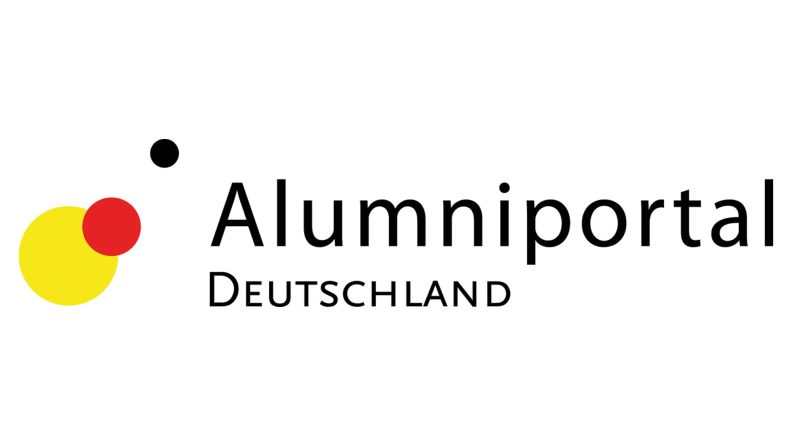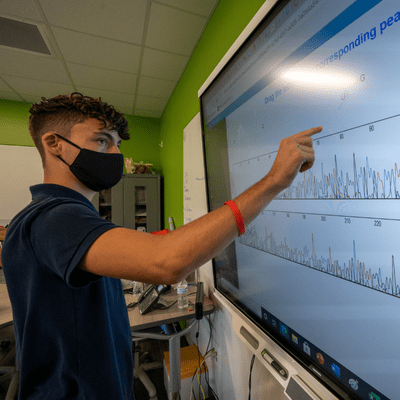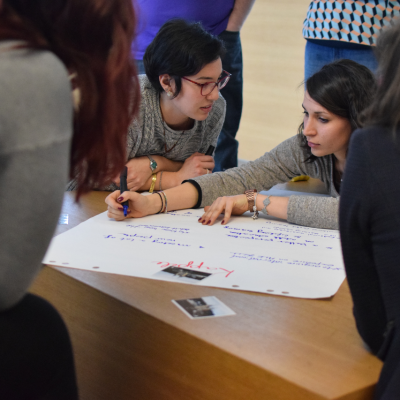🔥 New : Get answers to your personal questions.

An Introduction to the German School System
Researched & written
by Yvonne Koppen
May 27, 2024
The German school system, along with the higher education system, is known worldwide for its quality and accessibility, thanks to no tuition fees . Yet, the German education system is very complex and differs from those in other Western countries.
This article will introduce you to the German school system’s general structure and the many different study paths and opportunities for students in Germany. At the end of the article, we have compiled interesting facts and statistics about schooling in Germany.
🖌️ Table of Contents
How does the German school system work?
The German school system is a rather complex one and can be quite confusing at first sight. There are multiple ways to acquire a school degree and higher-level education, depending on each student’s interests, skills, and abilities.
The public school system is the centerpiece of Germany’s school system, despite private schools becoming more popular and almost doubling over the past two decades .
Every German state ( Bundesland ) is responsible for its education policy, from school types to school calendars and class subjects. However, the ministers of education from each of the sixteen states meet twice a year at a national conference ( Kultusministerkonferenz) to align their plans and practices.
There is no regional draft as to which school a student has to attend. Families in Germany are free to choose the school for their children.
If you are interested in the specific school system in the different German states, take a look at these individual guidelines . Otherwise, let’s have a look at the general system and its different school types.
Compulsory school attendance in Germany
Children living in Germany at the age of six to fifteen must attend school ( Schulpflicht ). The compulsory school attendance in Germany has its foundation in the German constitution ( Grundgesetz ). It is designed to allow every child proper and qualified education, regardless of the family’s financial situation, to mix social classes, and prevent religious or ideological parallel societies.
Consequently, home-schooling is illegal in Germany.
Preschool education in Germany
Whether it is kindergarten, daycare, or nursery, any type of preschool is optional and not part of the German public school system. There are many different types of preschool education in Germany. The traditional Kindergarten is for children from age three to six, whereas the Kita ( Kindertagesstätte ) already takes infants from six months old.
However, there is a chronic lack of enough spots for children, making it very stressful and tedious for parents to find a daycare place for their young kids close to home. We have heard stories from friends with children who had to apply for a Kita spot while still pregnant to stand a chance of getting one.
For all parents in Berlin
Kietzee is a new initiative to help parents find a Kita spot in Berlin faster and with less stress. You can join the community club and benefit from how-to content and reviews from other parents.
The cost of daycare differs from state to state. In Dusseldorf, where we live, daycare for children between three and six years old is free, while the cost for children younger than three depends on the parents’ income and the hours of caretaking per week. Example calculation for Kita cost in Dusseldorf for a child younger than three years: 35 hours of caretaking with a yearly income up to 60.000 euros cost 200 euros per week.
Next to preschool, parents also have the option to stay at home for up to three years while still being able to return to their job, thanks to a very supportive parental leave system. As a parent in Germany, you can also apply for parental allowance , which is financial support from the German government for the first two years after your child is born.
Read Our Related Guide
Parental Leave In Germany [Elternzeit] Parental Allowance In Germany [Elterngeld]
Primary School in Germany ( Grundschule )
In Germany, primary school is the so-called elementary school ( Grundschule ) for grades 1-4 (in Berlin and Brandenburg, grades 1-6). There are 15.447 primary schools in Germany. Starting primary school is the official beginning of German school education. This is a big day for kids, which is celebrated with the entire family. In German, it is called Einschulung , and tradition has it that kids get a big school cone ( Schultüte ) filled with school stationery, sweets, small gifts, and sometimes money.

The typical age to start primary education is six years, although exceedingly bright kids can start school in some states already at five years of age, and those that are not ready yet can start at seven years of age.
Primary schools in Germany usually take place for half-days. Parents can choose the school themselves and have to sign their children up for school and make sure that they attend regularly. Students learn to read and write, the basics of math and English in elementary school.
At the end of primary school, teachers recommend which secondary school to continue with, although it is the parents’ choice to follow that recommendation.
Secondary School in Germany ( Weiterführende Schule )
In most German states, secondary school starts with fifth grade, and this is when the differences in the German education system start. Every German state has its own school system and different names for specific schools. Despite that, there are three general types of schools in Germany that determine different education tracks and career possibilities. Those three types of German schools are Hauptschule , Realschule , and Gymnasium .
Secondary education in Germany is split into two parts: secondary level I and secondary level II. Secondary level I describes grades 5 to 10, and secondary level II describes grades 11-13.
Hauptschule (5-9th Grade)
There are 1.818 Hauptschulen in Germany. Generally speaking, the Hauptschule (in some states called Mittelschule) offers the lowest, least demanding learning level in the German education system. It is an excellent choice for pupils who want to continue their education with an apprenticeship in craft or industrial trades – the famous German Ausbildung .
The Hauptschule gets them ready for such vocational training, starting after the final examination ( Hauptschulabschluss ) after grade 9. Students that attend the Hauptschule can also decide to study one more year to finish with the higher-rated Realschul degree at the end of 10th grade.
After graduating from the Hauptschule , the education continues as part of a two to three-year-long vocational training, which operates in a dual system. Students spend around three days a week in their company and around two days a week at vocational school ( Berufsschule ). These students/workers are referred to as Auszubildende or short Azubis . They usually get paid by the company around 1/3 of the standard salary for the job they are training in.
After completing their vocational school and training, they are certified tradespeople of the chosen craft.
Realschule (5-10th Grade)
There are 1.752 Realschulen in Germany. The Realschule in Germany offers mid-level education. It is more challenging than the Hauptschule , but a step lower than the Gymnasium . The Realschule prepares students with practical and theoretical knowledge for their future professional life. Students usually have the option to choose a focus area, such as an additional foreign language or science subject.
After completing the Realschulabschluss , a.k.a. Mittlere Reife or Fachoberschulreife , students have multiple options to continue their education. Should their grades and performance have been satisfactory, they stand the option to continue to the higher level of secondary school at a Gymnasium . They also have the option to pursue vocational training ( Ausbildung ) or attend an internship for a better orientation of their desired profession.
As a last option, students completing the Realschule can also take a year for volunteering ( Freiwilligendienst ). This is quite common in Germany; it helps to gain professional experience and orientation for future education. There are different types of volunteering opportunities in the social, ecological, and cultural areas within Germany and abroad.
Even without an Abitur (see Gymnasium ), students with a Realschulabschluss also have the possibility to continue with higher education . That is after they completed their three-year vocational training and gained a few years of work experience.
Gymnasium (5-12/13th Grade)
The Gymnasium is the highest form of secondary education and aims to prepare students for continued university education. It is the most popular school type in Germany’s secondary school system, with a total of 3.146 Gymnasien . You can find different types of Gymnasien in Germany. Some are boys and girls only; the church runs some, and others focus on sports, science, or arts. It is not uncommon that a Gymnasium and Realschule share the same building and schoolyard.
Traditionally the Gymnasium has nine grades (G9), leading to a total of 13 years in school. However, in the early 2000s, a school reform decided to cut one year (while keeping the same amount of learning matter) to end the school education after grade 12 (G-8). This change should allow German students to be more competitive with other European students, who finish school at a younger age.
There have been huge protests and discussions regarding this reform, as students got overwhelmed and had no more time for social activities in the afternoons. Today, a lot of states have returned to G-9 and a total of 13 years in school. The curriculum at a Gymnasium has an academic focus, with a minimum of two foreign languages, higher math, and science courses, with the goal to reach the university level.
The secondary level II, which starts with grade 11 serves as a preparation for future university studies. Students have to choose two focus subjects ( Leistungskurse ) and two additional subjects for the big final exam, known as Abitur or Allgemeine Hochschulreife .
A German university must accept any student with an Abi (short for Abitur ); however, there are no guarantees that the student gets accepted to their desired field of study. The final grade of the Abitur (also referred to as NC for numerus clausus) plays a big role in getting accepted by the favorable university to the desired field of study. Especially degree courses like law and medicine are highly competitive and require an Abitur with a stellar NC or flexibility in terms of the university’s location.
Gesamtschule (5-13th Grade)
The Gesamtschule combines all three tracks of school education in one comprehensive school, making it easier to switch tracks if necessary. It was introduced in the late 1960s with the idea to replace the traditional three school system but it was never fully adapted. In some German states, the comprehensive school coexists with the three traditional schools.
While the traditional three main schools usually only have half-day classes, a lot of Gesamtschulen offer full-day classes. There are currently 2.141 integrated Gesamtschulen in Germany.
Special Needs Schools In Germany
There are very few schools in Germany with an inclusive concept for children and teenagers with learning disabilities. Instead, there are specific schools for students with special needs. Those schools are called Förderschule or Sonderschule . There is some controversy regarding this system, as it prevents disabled students from integrating into daily life.
International Schools In Germany
International schools are gaining in popularity in Germany, amongst German and expat families alike. Most international schools in Germany are private schools with a tuition fee and teach in English or bilingual. They teach in smaller classes and do not follow the German curriculum. Most international schools in Germany teach to acquire the International Baccalaureate (IB) degree after 12th grade. This means that students at international schools will mostly not get the Abitur . Though, the IB will allow them to study at German and international universities. With the following link, you can find an overview of international schools in Germany .
Private Schools In Germany
Private schools have never played such a big role in Germany compared to other countries. However, private schools have doubled in the last two decades, making it 5.855 private schools in Germany in 2020/2021 . Those range from elementary schools to higher education institutes.
Private schools typically charge tuition fees and require an admission test. They follow the German curriculum to attain the Abitur , while some also offer other diplomas.
While there is no school uniform at public schools in Germany, some private schools have them implemented. Students in Eastern and Southern Germany attend private schools a lot more than in Northern and Western Germany.
Unlike in other countries, private schools have to stagger the tuition fees based on the parents’ income or offer different benefits. As per the German basic law ( Grundgesetz ), private schools cannot cause a divide in society due to some families’ financial possibilities or lack thereof. In 2016, the average tuition fee per year per child was 2.000 euros.
Boarding Schools In Germany
A boarding school in Germany is called Internat , and there are over 250 different boarding schools in Germany . They range from elite-type with a high academic focus and strict rules to sport or music boarding schools. Some of the Internate are still boys and girls only.
Almost all boarding schools in Germany are private schools, and they follow the German curriculum up to the Abitur while also offering specialized courses and activities.
Higher Education in Germany
Germany is renowned for offering high-class tuition-free university education. In some states, there is a so-called Semesterbeitrag (semester contribution) of about 50 to 300 euros and a special tuition charge if a student exceeds the regular study-time. Foreign exchange students may also have to pay fees for specific programs. According to the QS-Ranking , 12 German universities are rated amongst the best 200 universities in the world.
Next to traditional universities, which focus mainly on theoretical studies, there are plenty of other higher education schools in Germany. According to Statista , in 2020/2021, Germany had a total of 422 higher education schools . Those consist of:
- 210 universities for applied science ( Fachhochschule or FH ), which focus on a more practical way of teaching
- 108 universities ( Universität )
- 52 art colleges ( Kunsthochschulen )
- 30 administrative training institutes ( Verwaltungsfachhochschulen )
- 16 theological institutes ( theologische Hochschulen )
- 6 teacher training colleges ( pädagogische Hochschulen )
The number of students pursuing academic degrees in Germany increased by 52% from 2002 to 2021, making it 2.944.145 students.
Germany’s academic curriculum was changed and adjusted to international standards in 2002 by introducing the Bachelor and Master degrees. The previous ‘Diplom’ took mostly four years to acquire. Nowadays, the Bachelor takes three years, optionally followed by a one or two-year Master.
Is schooling free in Germany?
Yes, it is. Germany’s public education system, including universities, is open to anyone living in Germany at pretty much no cost if the qualifications are met. The cost for required study materials, school trips, or exchanges needs to be covered by each student or family individually.
The German school year explained
The German school year has two terms, the 1. Halbjahr usually ends at the end of January and the 2. Halbjahr usually ends in June or July. When a school year in Germany starts and ends differs from state to state. To avoid overcrowding, traffic jams, and sold-out tourist destinations, the 16 different German states have a staggered vacation schedule, which rotates every year. Historically though, the southern states of Bavaria and Baden-Württemberg always start the school year last.
Generally speaking, school in Germany starts in late summer (Mid-August to Mid-September). Instead of one very long break in summer, the German school year has several shorter vacation periods ( Schulferien ).
These are the main German school vacation periods:
- 2 weeks Fall vacation ( Herbstferien )
- 2 weeks Christmas and New Years vacation ( Weihnachtsferien )
- 2 weeks Easter vacation ( Osterferien )
- 6 weeks Summer vacation ( Sommerferien )
Schulferien.org always lists the vacation schedule per state and year.
The German school day explained
A typical German school day starts around 8 am and finishes around 1 pm, with six 45-minutes classes and two breaks ( Große Pause ) . When joining a school in Germany, a student becomes part of a fixed class with a lead teacher ( Klassenlehrer ). The class remains the same for the entire school education (for elementary and secondary level I school), except for elective subjects. The lead teacher usually changes about every three years.
Each class usually gets their classroom ( Klassenzimmer ), where they get all the main classes taught. Students usually move to another or specifically equipped classroom for specialized school lessons, such as science, sports, art, and elective subjects.
Each term, the class gets a new timetable, which repeats itself each week. Below you can find an exemplary German timetable. Please note that every school and state will have a slightly different format.
Example of a German timetable in Secondary School
Most German schools don’t have a cafeteria, and students eat at home. There are usually some extra-curricular clubs that occur once a week; however, most afternoon activities, whether athletics, art, or music, occur outside of school at clubs or dedicated private schools.
In recent years, the concept of full-day school (often in form of a Gesamtschule ) has become more popular but remains a minority, as cafeterias have to be added to schools.
German grading system in Secondary Schools
The German grading system in secondary school relies on the following 6-mark number system :
An exam or an entire grade gets passed with a 1-4. If the school certificate ( Zeugnis ) at the end of the school year shows two or more 5s or one 6, the student usually has to repeat the entire school year. Usually, a student can repeat a school year twice during their education before having to change the school track to a less challenging school. The Germans call the repetition of a school year’ sitzen bleiben ‘, which literally means to stay seated.
When attending a Gymnasium , there is one exception. While 5th and 6th grade serve as an orientation phase of whether the Gymnasium is the right fit for the student. The 7th grade is the so-called trial year and can’t be repeated. If a student fails to pass this grade, they have to change tracks to Realschule .
It is not uncommon that students, who received a 5 or 6 on a paper or exam during the school year, have to get the grade (which is written below the exam) signed by their parents to ensure that parents are aware of their child’s performance. In addition, schools send the so-called ‘ Blaue Briefe ‘ letters in a blue envelope at least ten weeks before the final Zeugnis to the parents of students at risk of needing to repeat the school year.
In certain cases, it is also possible for especially bright and talented students to skip one grade. If teachers, the school’s direction, and parents agree, it is beneficial for the student.
German school system facts
We have researched and collected some stats and facts regarding the German school system. Here it goes.
- Students typically start school at the age of six
- Students must attend school for at least 9-12 years
- 752 700 students began elementary school in 2020
- 8.38 million students attended general education schools in 2020
- 790.608 teachers taught at general education schools in 2020
- Students start to learn English in 1st grade
- The oldest school in Germany was founded in 804
- 11% of all general education schools were private schools in 2019
- 29% of all 30-34 year olds held an academic degree in 2017
- 32% of all people above the age of 15 in 2017 had finished high school with an Abitur
- 23% of all people above the age of 15 in 2017 had finished high school with a Realschulabschluss
- 30% of all people above the age of 15 in 2017 had finished high school with a Hauptschulabschluss
Final thoughts
The German education system is so complex and versatile to allow every student to match their abilities. Despite the lack of digitalization in most German schools, Germany’s school system is quite good compared to other countries . Be aware, though, that you will hear lots of Germans complain about it.
Support Simple Germany
You can support our work by buying us a virtual coffee. Your donation helps us research and create ad-free content like this one.
Join us in our goal to empower internationals like you to settle into life in Germany more smoothly.
About the Author
Yvonne Koppen is a researcher and writer at Simple Germany, focusing on demystifying German bureaucracy for international skilled workers.
She has lived and worked abroad, which helps her understand how difficult a move to a new country can be. Beyond her professional pursuits, Yvonne loves to plan and go on road trips, puzzle, and do a triathlon here and there.
She is committed to creating accessible, empowering content through her writing and YouTube videos. Yvonne's passion for continuous learning and her ability to simplify complex topics make her an invaluable resource for expats seeking to navigate their new life in Germany.
You Might Also Enjoy These Guides
How does maternity leave in germany [mutterschutz] work, how does parental leave in germany [elternzeit] work, how does parental allowance in germany [elterngeld] work, getting married in germany [how-to english guide], divorce in germany [how-to english guide], kindergeld in germany [everything you need to know].

Empowering internationals to settle into life in Germany more smoothly.
- Germany Explained
- Service Providers
- Book a Consultation
- Scoring System
- Support Us 💜
- Social Impact
- Podcast Interviews
- Brand Assets
Cookie Policy
Privacy Policy
Refund Policy
in Düsseldorf
© All Rights Reserved. Simple Germany is a trademark registered in the European Union.
As an Amazon Associate we earn from qualifying purchases.

Your guide to studying in Germany

Topics on this page
Facts and figures, application, tips and tricks, step by step, universities and costs.
- Study in Germany
Can I study in Germany for free? Which is the best uni in Germany? How do I apply for a student visa? How can I study in Germany on a scholarship? In Germany are there uni courses in English? And what requirements do I have to meet? This is where you’ll find the answers to all these questions – and many more besides.

You can find out more about the German higher education landscape from the DAAD.
The DAAD has information about the various degree courses.
The DAAD provides an overview of degree courses with an international orientation.
The DAAD provides an overview of online degree courses.
You can use the DAAD’s database to check whether your qualification will be recognised.
The DAAD provides information about visa requirements.
The DAAD has information about studying and German language requirements.
The DAAD tells you about the costs of studying and living in Germany.
The DAAD provides an overview of its funding programmes.
The DAAD has information about the funding on offer from other organisations.
The DAAD tells you about the application process and prerequisites.

“Research in Germany” provides facts about doing a PhD.
“Research in Germany” explains the different paths.
“Research in Germany” provides information about finding a PhD place.
“Research in Germany” gives tips on applying.
“Research in Germany” lists the various funding opportunities.
The DAAD provides advice on studying in Germany.
“Research in Germany” provides advice on doing a PhD in Germany.

International alumni keep in touch via the “Alumniportal Deutschland”.
What to study in Germany?
Employers worldwide value German degrees. And there is a huge range of courses on offer: Germany boasts more than 420 higher education institutions with over 21,000 different study programmes. You want to do your Bachelor’s or Master’s degree in Germany? There is a suitable programme for almost every project. Whether you want to study medicine, environmental engineering, robotics, agricultural sciencesor peace and conflict research, you will find the right course.

Studying abroad in Germany
Germany is considered an attractive study destination worldwide and is one of the most popular destinations for international students. Some 11 per cent of all students at German universities came from abroad in 2021. And there are plenty of reasons for that. Here are some facts and figures about studying in Germany.
Quick facts
Requirements to study in germany.
So how can I study in Germany? You need to fulfil certain requirements to apply to German universities and to study in Germany on undergraduate or doctoral programmes. What is more, applications differ greatly from those for a job, for instance. Your first port of call is the Akademisches Auslandsamt (AAA) of the university you wish to attend in Germany. At some universities it is called the International Office or International Center (IC). There advisers are on hand to provide comprehensive information on the application process: admission requirements, deadlines, application requirements, language courses and much more besides. Here you can find guides on studying or doing a doctorate in Germany.

Testimonials and helpful links
How well do I have to speak German, how do I find the right university? Here you will find answers, the most important websites and contact persons. In addition, foreign students tell you about their insider tips for studying in Germany.

Applying for a student visa in Germany

Tertiary education institutions in Germany
Germany has a total of 423 institutions of tertiary education, of which 120 are universities, 246 universities of applied sciences and 57 art academies. Most higher education institutions cooperate with several universities and institutes abroad.

Our partners
- Deutscher Akademischer Austauschdienst
- Alumniportal Deutschland
- Goethe-Institut
- Facts about Germany
- Deutsche Welle
Eduserver - Education in Germany - German Education Server
The quick search option allows you to use the free text box and search across all relevant databases on the German Education Server. This works similar to Google: enter one or more search terms in the box (separated by blank spaces) and then click onto the magnifying glass to the right, or press ENTER. Please note you will be searching in English here.
Ariadne path:
Eduserver - education in germany.

Eduserver, the English language version of the German Education Server, provides access to documents and background information regarding the German education system and its international context. You can browse and search, subscribe to the English language RSS newsfeed , write to the editor , or check out “What’s new”. Dossiers are regularly offered.
New dossier
Health education and healthcare in germany.
Information about the German healthcare system for international users
Education, education, education

A selection of English language documents regarding the German education system and related aspects.
Educational initiative "GIMAGINE" for schools (Goethe-Institut in the UK)
An initiative targeting 14-18-year old students in the United Kingdom who are keen to learn German including a learning platform and competition.
Educational initiative "GIMAGINE" for schools (Goethe-Institut in the UK) : Read more
Educational initiative "GIMAGINE" for schools (Goethe-Institut in the UK) Report a broken link
other interesting sites
Refugees from ukraine, the german education system: basic facts.
German education system: structure, funding
Youth work and youth policy in Germany and Europe
Youth policy, research and legislation in Germany, in the European framework
- Official addresses: ministries, agencies, institutions
- Current topics - what is happening in Germany
- Teaching and practising democratic values in Europe
- Cultural Education in Germany
- Refugees in Germany
- Coronavirus in Germany
- German literature and searching for literature in Germany
- Holocaust Education
- Working and living in Germany
- Highly qualified, skilled migrants
- Recognition of qualifications
- Learning and teaching German
- Find out more about Germany
- General information
- Official addresses
- Education system Germany
- Exchange programmes
- Germany for young people
- Learning German
- Work & life in Germany
- Current topics - in Germany
Cooperations
Share content on social platforms (requires javascript)

School system & compulsory education
Germany is known worldwide for its education system. Here you can find out more about the German school system.
- Living in Germany
- Family life in Germany
- School system & compulsory education
Germany's school system
Once your children are six years old, they are required to go to school, since school attendance is compulsory in Germany. Most German schools are run by the state and there is no charge for your children to attend. In addition, there are private and international schools which charge fees.
The individual states are responsible for education policy. This means that the school system will to some extent depend on the region where you and your family are living. Children do not always have the same curriculum in every state, and textbooks may differ as well. Individual states also have different types of schools. Generally, the German school system is structured as follows:
Grundschule (primary school): Normally, six-year-olds begin their school careers at primary school, which covers the first four grades. Only in Berlin and Brandenburg does primary school continue up to sixth grade. At the end of primary school, you and your child's teachers will decide which secondary school your child will attend, considering your child's academic performance.
Weiterführende Schulen (secondary schools) – the most common types are:
- Hauptschule (secondary general school for grades 5 through 9 or 10)
- Realschule (more practical secondary school for grades 5 through 10)
- Gymnasium (more academic secondary school for grades 5 through 12 or 13)
- Gesamtschule (comprehensive school for grades 5 through 12 or 13)
Hauptschule and Realschule: Young people who have successfully completed the Hauptschule or Realschule are eligible for vocational training, or can transfer to the Sekundarstufe II/ Oberstufe (≈ sixth form) at a Gymnasium or Gesamtschule .
Gesamtschule: Combines the Hauptschule , Realschule and Gymnasium and offers an alternative to the tripartite school system.
Gymnasium: At the end of the 12th or 13th grade, students take examinations known as the Abitur and if successful graduate from secondary school with a certificate of advanced secondary education, entitling them to study at a university or at a university of applied sciences . However, they may also choose to undergo vocational training and enter the job market directly.
Germany's education system
School enrolment of children and teenagers newly arrived from abroad
If your children are of school age when entering Germany, you will no doubt be wondering how they can be found a place in a school. This is decided by the school management in consultation with the local education authority. As a general rule, children who have recently entered the country are not able to attend regular school lessons and will be offered special trial lessons instead due to their lack of German skills. The goal is to integrate them as soon as possible into regular school classes.
How to recognise a good school
As a rule, you are free to decide which school your child should attend. It is therefore a good idea to take a look at a few schools. One sign of a good school is that it not only provides high-quality instruction, but also offers extracurricular activities such as theatre, sports, language and music clubs, and school trips. A good school also encourages parent involvement. In addition to finding out whether the school has a place for your child, you should also ask about extracurricular options. If your children are not yet fluent in German, make sure that the school offers German classes, usually referred to as Deutsch als Zweitsprache (German as a foreign language). Here the teachers will make sure that your child understands the lessons and can keep up with the curriculum.

Video: Career and families in Germany
More videos
An attractive school system
Information on the web.
- Association of German International Schools Federation of international schools in Germany
- Standing Conference of the Ministers of Education and Cultural Affairs of the Federal States (KMK) Germany’s school system
- German education server Search portal for schools
- PrivatschulBeratung Search for private schools and boarding schools
Do you have any questions?
Let us advise you on your opportunities to work and live in Germany. Our experts will support you with questions regarding job search, visa, recognition and learning German.
You can find out more about the various contact options by clicking on one of the icons in the bar below.
- Learn more about: E-Mail E-Mail
- Learn more about: Hotline Hotline
- Learn more about: FAQ FAQ
Please switch to a modern browser (e.g. Google Chrome, Firefox or Microsoft Edge) in order to enjoy the best user experience.
Proceed anyway
- Plan Your Studies
- Study Programs
- Universities
- Requirements
- Living in Germany
- Statistics & News

Applying For a Master’s Degree in Germany
Master’s programs in Germany offer a diverse range of options, with many taught in English. They are known for their affordability, top-notch curricula, hands-on learning, and excellent career prospects. So, it’s no wonder that master’s degrees are the go-to choice for international students in Germany. During the 2021/2022 period, 42.6% of them (148,901 students) were enrolled in master’s programs.
But don’t let the application process hold you back – we’re here to guide you through the steps and set you on the path to success in Deutschland!
Here are the main steps to apply for a master’s degree in Germany:
Research and Choose a Master’s Program
Check admission requirements.
- Gather Documents and Meet All Requirements
Secure Funding
Submit your application, wait for the admission letter, get health insurance, apply for the german student visa.
When it comes to pursuing a master’s degree in Germany, the initial step is all about research and making an informed choice. Start by assessing your career goals and pinpoint the field of study that aligns with your aspirations. Look into the curriculum to ensure it covers the subjects that pique your interest.
Language matters too — many programs are available in English, but if you’re proficient in German, it opens up more options. When it comes to costs, most programs are quite affordable or even tuition-free, but be sure to check tuition fees just in case.
To aid your search, German study program databases and university websites offer detailed program information and application guidelines. Take your time to explore and find the program that’s the perfect fit for your educational journey.

Study at GISMA University of Applied Sciences
Be one step ahead with a globally recognised college in Germany!
> Check out our list of over 9,000 master’s study programs in Germany.
Once you’ve picked a couple of programs that pique your interest and align with your study goals, it’s time to check if you meet their admission requirements or can meet them by the application deadline.
While each program may have its unique requirements, let’s explore some of the most common admission criteria for master’s programs in Germany:
- Bachelor’s degree. You have graduated or will graduate from a program equivalent to a German bachelor’s degree, often in a related field to the master’s program you’re applying for.
- Transcripts and diplomas . Submit transcripts and copies of your academic diplomas from previous educational institutions.
- Subject-specific knowledge . Some programs may require you to have gained specific subject knowledge or credits during your prior education. Business schools and MBA programs may require a particular score from recognized tests, like GMAT or GRE.
- Language proficiency. Demonstrate proficiency in the language of instruction, which is typically English or German. Proof of language proficiency is often required through standardized tests like IELTS, TOEFL, TestDaF, or DSH.
- Curriculum vitae (CV) or resume . Provide a comprehensive CV or resume detailing your academic and professional background.
- Statement of purpose & letters of recommendation. Some universities may request a Statement of Purpose (SOP), which details your motivations and goals, along with one to two letters of recommendation from professors or professionals.
> Visit our full guide of admission requirements for master’s programs in Germany for more details.
Gather Documents and Ensure You Meet All Requirements
After reviewing admission requirements and selecting your program(s), it’s time to start gathering what you need for your application, including transcripts, motivation letter, etc.
This is also an ideal time to confirm that you meet your university’s language proficiency requirements. Depending on your program’s language (English or German), you may take a standardized language test or provide alternative proof. Consider language courses if improvement is needed.
According to the German government’s regulations, international students planning to study in Germany must demonstrate financial resources of at least €11,208 per year (equivalent to €934 per month) to qualify for a student visa and pursue a master’s degree in the country.
This financial requirement may seem daunting for many students, so it’s crucial to address this well in advance of the official application period at your preferred German university. You can meet this requirement in various ways:
- Having €11,208 deposited in a German blocked account .
- Your parents can provide documentation of their income and financial resources.
- Someone with permanent residence in Germany can guarantee to the Alien Registration Office that they will financially support you.
- Present a scholarship awarding certificate specifying the financial amount or coverage granted to you.
Important Tip: To Maximize Your Chances of Getting Your German Student Visa You Should Use a Blocked Account as Proof of Financial Resources.
A blocked account is a special type of bank account , to prove you have enough funds to live in Germany for one year.
As of 2022, as a foreigner in Germany you need a minimum of €934 euros per month for living expenses. So, you are required to have a total of €11,208 in your bank account before you apply for a German internship visa.
Click here to learn more about the German Blocked Account
Planning ahead is important before your preferred German university’s application deadline, as this amount may be substantial for most students. Usually, four to six months prior should provide enough time to save money and explore scholarship and loan options.
Now is the exciting time to send in your application! Most universities have their own application portals where you’ll need to create an account, or they might use uni-assist for handling applications.
Make sure to read and follow all the instructions on the master’s program website, and be sure to submit all the required documents. It’s crucial to respect the application deadlines; your application won’t be processed if you miss the deadline.
Once your application is submitted, the next step is simply waiting for the university’s decision. While you wait, you might want to brush up on your language skills or start looking into the specific visa and travel requirements for Germany. It’s also a good time to explore accommodation options.
The university will notify you via email about the status of your application, and if you’re accepted, they’ll include the next steps you should follow.
Health insurance is a must for all international students in Germany. You can kickstart this process after receiving your admission letter or once you arrive in Germany.
If your home country has an agreement with Germany, you can often use your current health insurance, typically with a European Health Insurance Card (EHIC). In some cases, private health insurance from other countries may also be accepted.
Alternatively, you can choose to obtain insurance through a provider in Germany, with student packages usually priced around €120 per month, depending on your age and the provider.
Most international students in Germany prefer to get health insured with DR-WALTER .
EDUCARE24 by DR-WALTER is suitable for the following groups of people:
- Foreign exchange students, language students and students participating in university preparatory courses (Studienkolleg)
- University students
- Participants in exchange programmes (e.g. ERASMUS, DAAD, SOKRATES)
- Accompanying family members
Still have questions about health insurance? Learn more about health insurance in Germany from experts.
Get DR-WALTER insurance online within a few minutes
With a few exceptions, the majority of international students planning to study in Germany require a student visa. Our German student visa guide covers everything you need to know about this process, from requirements to the application process, fees, and more.
To kickstart the process, set up a visa interview at the German Embassy or Consulate in your home country, ideally about three months before your planned start of studies.
During the interview, provide all the required documents like proof of admission, language proficiency, financial means, and health insurance. Be ready for potential requests for more documents during the interview, and make sure your passport stays valid for your entire stay.
Arrive in Germany and Attend Orientation
Once your German student visa is sorted, it’s time to get on that plane and arrive in Germany. After settling in, make use of the pre-semester orientation sessions at German universities. Some things addressed through the orientation or to over on your own include:
- You’ll complete the enrollment process , which involves registering for your courses, receiving your class schedule, and learning about academic requirements.
- Getting your student ID . You’ll be issued a student identification card, often referred to as a “Studierendenausweis” in German.
- Residence registration. Once you’re in Germany, you will have to register your residence. This is a mandatory process that involves obtaining a “Meldebescheinigung” from the Resident’s Registration Office (Einwohnermeldeamt).
- Opening a local bank account. Orientation often provides guidance on opening a bank account in Germany.
- Campus tour. You’ll explore the campus to discover its facilities, libraries, and labs.
- Language courses. Some universities offer language courses or resources to help international students improve their German language skills if necessary.
Frequently Asked Questions (FAQ) & Additional Information
Below, you’ll find answers to common questions and additional information to support you on your path to pursuing a master’s degree in Germany:
Which Universities Offer Master’s Degree Programs in Germany?
The higher education system in Germany includes public universities, funded and regulated by the state, and private universities established by independent entities.
While private universities may have higher fees, they are valuable for specialized courses not available at public institutions. Public universities in Germany have their own degree programs, assessments, and entry requirements, with state oversight to ensure the quality and accreditation of courses.
Germany has four main types of higher education institutions that offer master’s degree programs:
- Research Universities. These publicly administered institutions offer Master’s and PhD programs, focusing on various academic disciplines.
- Technical Universities. A subgroup of research universities, they specialize in science, technology, and engineering fields.
- Universities of Applied Sciences. These institutions concentrate on engineering, business, and social sciences, often partnering with professional organizations.
- Colleges of Art, Film, and Music. These institutions provide instruction in creative fields and can be part of research universities or universities of applied sciences.

What Are the Types of Master’s Degrees in Germany?
In Germany, you can pursue various types of Master’s degrees. Some of the most common include:
- Master of Arts (MA). Awarded in humanities, social sciences, and arts-related fields.
- Master of Science (MSc) . Awarded in science, technology, engineering, and mathematics (STEM) disciplines.
- Master of Business Administration (MBA). Focuses on management and business administration topics.
- Master of Education (M.Ed.). For degrees for high school teacher positions.
What Are Consecutive and Non-consecutive Master’s Degrees?
Consecutive master’s Degrees in Germany follow a logical progression from a related bachelor’s degree and build upon the same academic field. They provide in-depth knowledge and specialization within the same subject area.
Non-consecutive master’s Degrees, on the other hand, don’t necessarily need a bachelor’s degree in the same field. Students with diverse academic backgrounds can go for non-consecutive master’s programs, which often focus on broader skills and interdisciplinary knowledge. These programs may include extra coursework to bridge any knowledge gaps.
How Long Is a Master’s Degree in Germany?
A master’s degree in Germany typically lasts for one to two years, depending on the specific program and the number of semesters required. Each academic year consists of two semesters, and the program may also include a final project or dissertation conducted in collaboration with a mentor.
How Many ECTS Credits Is a German Master’s Degree Worth?
Master’s programs in Germany typically consist of 120 ECTS (European Credit Transfer and Accumulation System) credits. However, the exact number of credits may vary depending on the university and the specific program.
What is Numerus Clausus?
Numerus Clausus (NC) in German master’s programs is a restricted admission system where limited spots are available, and selection is based on factors like academic performance and qualifications. It controls program capacity to prevent overcrowding. Applicants compete for admission based on their qualifications, and requirements vary by program.
When Are Application Deadlines for Master’s Degrees in Germany?
There are two semesters in German universities; the winter semester and the summer semester. Application deadlines for master’s programs vary depending on the university, however, the most common dates are:
- For courses starting on the winter semester: July 15th
- For courses starting on the summer semester: January 15th
Can I Apply for a Master’s in Germany Before I Get My Undergraduate Degree?
Yes, it’s common for students to apply during the final year of their bachelor’s degree. However, you must provide proof of your current academic progress and an expected graduation date as part of your application.
What Are the Language Requirements for Master’s Degrees in Germany?
If your courses are in German, you’ll need to prove your proficiency through tests like TestDaf or DSH. A lower level of proficiency may be accepted if you continue taking language courses upon arriving in Germany or during the early stages of your Master’s program. However, language requirements for master’s programs in Germany can vary depending on the university and program
If you choose English-taught programs, no German language tests are required. Non-native English speakers may need to take English language tests like TOEFL, IELTS, and PTE. If you’ve completed your undergraduate studies in English, you typically won’t need English language tests.
To discover programs in your preferred language, explore our tool and select the program language from the options on the left.
How Much Does a Master’s Degree Cost in Germany?
In most public universities in Germany, semester fees for master’s programs typically range from €100 to €350 per semester, with some exceptions. Some specialized graduate programs may have tuition fees, and the federal states of Baden-Württemberg and Bavaria may charge tuition fees for non-EU international students.
Private universities set their own tuition fees, and the cost of master’s degrees can vary significantly, especially for programs like MBAs. At private universities in Germany, tuition fees can range from approximately €5,000 to €20,000 per year or more, depending on the institution and program.
To find out more about the costs of studying in Germany, visit our extensive guide .
Can I Work While Studying for a Master’s Degree in Germany?
Yes, students of all nationalities can work while studying for a master’s degree in Germany.
- EU, EEA, Swiss, and Norwegian students can work up to 20 hours per week. They can exceed this number, however they will have to pay social security contributions.
- Non-EU students can work up to 120 full days or 240 half days per year, but they face restrictions on self-employment and freelancing.
- Academic assistants have no limitations on workdays but are required to inform the foreigners’ office.
> Read more about working while studying in Germany .
What Is the Master’s Thesis Process Like in Germany?
In your final year of a master’s program in Germany, you’ll work on your thesis project, guided by a professor. The goal is to showcase your ability to tackle a subject-related issue independently using research methods.
You can usually write your thesis in German or English and may even complete it externally, like at a company or another research institute. Universities often set page limits, usually between 50 to 100 pages, and impose deadlines, typically around six months from the project start.
The thesis defense involves submitting your work and presenting your research methods and findings.
Study Visa Requirements for a Master’s Degree in Germany
Make sure you collect on time all the documents you typically need in order to apply for a German Student Visa .
For detailed information about Germany Visa requirements, go to www.germany-visa.org/student-visa/
What Are the Career Prospects With a German Master’s Degree?
With a German master’s degree, you’ll have excellent career prospects, especially in STEM fields . EU/EEA graduates can work immediately after graduation, while non-EU/EEA graduates can extend their residence permits for up to 18 months to find field-related jobs.
You can also pursue academic careers, and highly skilled non-EU graduates can apply for an EU Blue Card to work and stay in Germany. Plus, your German degree is globally recognized, offering international career opportunities in multinational companies and organizations.
Join 262,114 students interested in studying in Germany

Download The Guide

Quick Links
8 Steps to Study in Germany How To Apply To Study in Germany German Education System Requirements Universities in Germany International Programmes Financing Your Studies German Student Visa German Health Insurance Germany Blocked Account Learn German Guide German Cities Cost of Living
Latest News and Statistics
Bachelor students in germany more likely to drop out within first academic year, higher education in germany: key trends & statistics, new study reveals high level of satisfaction among students at german universities, germany scholarships up by 3% in 2023 – 31,400 students benefited, indians overcome chinese as top source of international students in germany.
- Privacy Policy
- Cookie Policy

- Book a demo
- Interactive Displays for Education
- 6000S series
- GX Zero series
- Interactive Whiteboard
- SMART Podium
- SMART Notebook ®
- SMART Remote Management
- Stands and wall mounts
- Computing modules
- Appliance modules
- SMART Document Camera
- All accessories
- Learn Lumio
- Lumio in 5 simple steps
- Research behind Lumio
- Learn SMART
- IQ in 5 simple steps
- Getting started with GX
- Notebook in 5 simple steps
- Professional Learning
- Customized professional learning
- Lumio Academy
- Lumio webinars
- SMART Academy
- SMART webinars
- Lumio communities
- SMART communities
- Ambassador sign in
- Ambassador application
- Accessibility in the classroom
- Higher education
- Customer stories
- All resources
- Upcoming education events
- Active learning
- Social emotional learning
- Accessible and inclusive classrooms
- Assess your EdTech
- Find a reseller
- Alabama ALJP
- Mississippi ITS
- Professional learning
Award-winning interactive displays + digital learning tools
Trusted solutions for the connections that matter, when you choose smart, you get powerful solutions for student engagement and so much more..
You get the support of a seriously experienced, time-tested EdTech company, ready to train, educate, and support, plus:
Unmatched ease of use
Unrivaled longevity, top-tier privacy and security, superior student engagement, highest satisfaction, the best fit for your ecosystem, exceptional innovation.
Real sustainability
Why thousands of districts and educators choose and stay with smart:.

Customer Story
5 Minute Read
Minarah College prepares students for the future with technology-fueled learning

Ship to Shore program showcases the power of project based learning

8 Minute Read
Building connections to digital literacy at Parcells Middle School

Jefferson County Public schools used ESSER federal funds to invest in tech for over 100,000 students and 6,500 teachers. SMART and CiT scaled a rollout plan that made implementation smooth and effective.

03:40 minutes
SMART teamed up with Visual Sound to bring powerful technology to over 100,000 high-risk students and 9,000 teachers in the School District of Philadelphia.

3 Minute Read
This Florida STEM high school puts students in the driver’s seat of their learning with a project-based approach to solving real-world issues in their community.
#WeAreSMART #ConnectionsThatMatter
See what’s new in
ONLY SMART’s industry-leading touch and ink technology enables multiple users to intuitively write, erase, touch, and gesture at the same time, over any program or app, without interfering with another’s tools.
Teachers love Lumio
Our award-winning learning software empowers teachers to transform any lesson into an engaging learning experience. From collaborative workspaces to on-the-fly assessments to game-based learning, Lumio equips teachers with everything they need to deliver dynamic lessons every single day.
SMART is in the news
Explore smart innovations, inspiring messages from our leaders and how we're making an impact worldwide..

2 Minute Read
TCEA 2024 Roundup | News from Austin’s EdTech Exposition

1 Minute Read
SMART Technologies CEO, Nicholas Svensson, appears on School For Startups Radio

Lumio by SMART Technologies expands portfolio with introduction of the Spark plan at Bett 2024

Everything you need to make the right purchase for your district
Specs, price, privacy and security, compatibility and usability are just a few of the components that tech buyers have to weigh as they advocate for their technology purchases.
In our Buyer’s Guide for interactive displays, we’ve made it easy to ensure you cover every base as you assess your display options.

Low-quality displays may cost more than you think.
Bargain buys can result in hidden costs that are more than you bargained for. Make sure you know the true cost of a display before you purchase.
Download our whitepaper so you can be sure you’re getting the best bang for your buck.
SMART is here to win with you
When you choose to sell SMART products, you’re backed by a highly-rated brand, world-class support and education expertise.

Ready to learn more?

Already a SMART Partner?
Let’s get started - together., our team of specialists is ready to answer any questions you have with a live demo..
The Economic Times daily newspaper is available online now.
Germany just launched its new point-based opportunity card. the best part you don't need a job offer or family sponsorship.
Germany's new Opportunity Card, also known as 'Chancenkarte,' offers a one-year residence permit for non-EU candidates to search for employment without a permanent contract, attracting skilled workers with simplified entry and job search processes.

Leaders flock to Delhi after BJP fails to get absolute majority| Catch it all live
Lost majority, but BJP has breached these citadels for the future
Weaker Modi 3.0 to slow India's big fiscal fight: Moody’s

Germany is the most preferred non-English-speaking job destination
How to Calculate your Points for the Opportunity Card
- Four points are given for partial recognition of foreign professional qualifications or permission to practice regulated professions such as teaching or engineering.
- Three points are awarded for five years of professional experience within the last seven years or good German language skills at B2 level.
- Two points are given for two years of professional experience following vocational training, or if the applicant is under 35 years old, and for German language skills at B1 level.
- One point is allocated for applicants under 40 years old or those with previous stays in Germany, excluding tourist visits.
- Additional points are available for very good English skills (C1), reasonable German skills (A2), qualifications in shortage occupations, or joint applications with a spouses
Key Benefits of the Opportunity Card
- Easy Entry: Simplified process to enter Germany.
- 12-Month Stay: One-year residency with the possibility of a permanent permit.
- Earning Potential: Over 1000 euros monthly income possible.
- Work Flexibility: Permit for up to 20 hours of work per week.
- Job Search Opportunity: Time to find a qualified part-time or full-time job.
Why Employers Prefer the Opportunity Card
- Expanded Applicant Pool: Access to qualified foreign professionals .
- Simplified Entry: No Federal Employment Agency approval needed.
- Fast-Track Hiring: Quick and easy entry procedures.
- Pre-Entry Contracts: Ability to secure part-time job contracts before the applicant's arrival.
Applying for the Opportunity Card

Schengen visas get costlier by 12% after European Union hikes fee
Proof of Previous Stay in Germany
Language tests you can use to apply for the opportunity card, german tests.
- Consists of four areas: Listening, reading, speaking and writing
- Includes six levels (like all German tests)
- Free online placement test
- A1 (understand simple German sentences)
- A2 (basic knowledge)
- B1 (intermediate)
- B2 (good Intermediate)
- C1 (advanced knowledge)
- C2 (excellent knowledge / mother-tongue level)
- German tests at Goethe-Institut
- Online courses available
- Certificates internationally recognised
- Free placement test
- Choose a language course at your level
- (A1 – A2 for language beginners, B1 – B2 for advanced knowledge, C1 – C2 as final levels)
- Exams available after each level
- Costs around 100 – 300 euros

GER-many opportunities for Indian students as European bigwig looks to fill labour gap
- German language skills tested at competence levels B2 – C1
- Offered in over 1000 test centres worldwide
- Tests reading comprehension, listening comprehension, written expression, oral expression
- Available digitally
- Costs around 215 euros
- Developed for foreign students
- Exams twice a year at special DSD schools worldwide
- Two diplomas available: DSD1, DSD2
- Reading comprehension, listening comprehension, written expression, oral expression
- Free of charge
- Suitable for candidates at language levels A2, B1, B2, C1
English tests
- Online at special test centres
- Duration around 4 hours
- Reading comprehension, listening comprehension, speaking (conversation) and written expression (essay)
- Costs around 200 euros
- British English as well as American English tests
- Duration around three hours
- Two variants: General (for expatriates and people who want to stay abroad for a longer period of time) and academic (for students who want to apply to a foreign university)
- Listening (comprehension), reading (comprehension), writing (phrasing), speaking (conversation)
- Costs around 226 euros
- Provided by the British Council , available in 17 cities in Germany
- You must first choose your language level and then pass the test
- Various categories:
- A1 – A2 Basic Users = Elementary language use
- B1 – B2 Independent Users = Independent language use
- C1 – C2 Proficient Users = Competent language use
- Duration around 3-4 hours
- Consists of reading and use (text and reading comprehension), writing (formal language), listening (comprehension), speaking (conversation)
- Offered by Cambridge University at 2700 test centres worldwide.
How will Modi-led NDA govt & BJP govt be different?
India's new govt likely to vote for populism in budget
Read More News on
(Catch all the Business News , Breaking News , Exit Polls News , Election Results News Events and Latest News Updates on The Economic Times .)
Subscribe to The Economic Times Prime and read the ET ePaper online.
Find this comment offensive?
Choose your reason below and click on the Report button. This will alert our moderators to take action
Reason for reporting:
Your Reason has been Reported to the admin.

To post this comment you must
Log In/Connect with:
Fill in your details:
Will be displayed
Will not be displayed
Share this Comment:
Uh-oh this is an exclusive story available for selected readers only..
Worry not. You’re just a step away.

Prime Account Detected!
It seems like you're already an ETPrime member with
Login using your ET Prime credentials to enjoy all member benefits
Log out of your current logged-in account and log in again using your ET Prime credentials to enjoy all member benefits.
To read full story, subscribe to ET Prime
₹34 per week
Billed annually at ₹2499 ₹1749
Super Saver Sale - Flat 30% Off
On ET Prime Membership
Unlock this story and enjoy all members-only benefits.
Offer Exclusively For You
Save up to Rs. 700/-
ON ET PRIME MEMBERSHIP
Get 1 Year Free
With 1 and 2-Year ET prime membership
Get Flat 40% Off
Then ₹ 1749 for 1 year
ET Prime at ₹ 49 for 1 month
Verdict Day Offer
Get flat 20% off on ETPrime
90 Days Prime access worth Rs999 unlocked for you

Exclusive Economic Times Stories, Editorials & Expert opinion across 20+ sectors
Stock analysis. Market Research. Industry Trends on 4000+ Stocks
Get 1 Year Complimentary Subscription of TOI+ worth Rs.799/-
Stories you might be interested in

- General Information
- Tuition fees
Application & Admission
Language requirements, program features.
- List of Universities
2734 Study programs

Study Pedagogy & Educational Sciences in Germany: 19 Universities with 19 English Degree Programs
All important info for international students in germany (2024/2025).
Master’s programs in Pedagogy/Educational Science in Germany focus on the research of educational institutions, the governance of education, educational practices, and psychological insights into the process of learning. Note that the programs in Educational Science or Pedagogy do not qualify students to become state-accredited teachers in Germany, but some of them focus on aspects of social work.
Some programs focus more heavily on research and the scientific and theoretical exploration of issues related to education, learning, and teaching. Other programs also have the goal to prepare their students for professional field work, for example in children’s rights, social work or Waldorf pedagogy. Some programs are very interdisciplinary and combine the field of education with subjects such as Medicine, Sports, Engineering, and Computer Science.
Therefore, students looking to study this subject in Germany can profit from diverse and cutting-edge programs. Take some time to explore the English-language programs in Pedagogy and Educational Science listed in our Study Finder.
Study Programs in English
Universities
Universities in International Rankings
€ 0 (9 programs for EU citizens, 8 programs for Non-EU citizens)
€ 6,900 per semester (1 program for EU citizens/Non-EU)
Winter Semester
between June 15 and May 03
Summer Semester
between and
Top-ranked German Universities in Pedagogy & Educational Sciences

public University
No. of Students: approx. 51,000 students
Program Fees: € 0 (per semester)

public Technical University
No. of Students: approx. 53,000 students
Program Fees: € 0 - € 4,000 (per semester)

No. of Students: approx. 20,000 students
Program Fees: € 1,700 (per semester)
Tuition Fees
3 english degree programs for pedagogy & educational sciences in germany.
Hochschule Bonn-Rhein-Sieg Sankt Augustin / Rheinbach
Corporate social responsibility & non-governmental organisations management (mba).

Friedensau Adventist University Möckern
International social work (isw).

Ruhr-Universität Bochum Bochum
Sport and excercise sciences for health and performance.

Application Deadlines
Winter Semester 2024/2025
Summer Semester 2025
Winter Semester 2025/2026
Open Programs
16 programs
Application Requirements
When you apply to a Master’s program in Germany, universities will usually expect you to have an academic degree in a related discipline. For Pedagogy/Educational Science, first degrees from academic fields such as Education, Pedagogy, Psychology, or Sociology are often accepted. For the more practically oriented courses, a degree in Social Work may be required. Note that some of the interdisciplinary programs are open to students of more diverse academic backgrounds. For example, some programs may only be open to engineers, computer scientists, dentists, or students of natural sciences. Usually, application tests or interviews are not part of the admission process, students must simply submit required documents. In addition to standard certificates (e.g. first degree certificate, a transcript of records, a language certificate), a CV and a letter of motivation are typically required. Some programs also require you to have prior coursework in scientific research methods. Programs may also ask their applicants for professional experiences.
Application Modes
Application process.
Julius-Maximilians-Universität Würzburg Würzburg
Double degree in management of educational services, adult and continuing education.

Alice Salomon University of Applied Sciences Berlin Berlin
Social work as a human rights profession.

Hochschule Fresenius - University of Applied Sciences Berlin
Philosophy, politics and economics.

TOEFL Scores
Cambridge Levels
5 (1 program )
61 (1 program )
B2 First (FCE) (5 programs )
7 (1 program )
92 (2 programs )
C2 Proficiency (CPE) (2 programs )
Fachhochschule Erfurt Erfurt
International social work.
Saarland University Saarbrücken
Educational technology.
Technical University of Applied Sciences Würzburg-Schweinfurt (THWS) Würzburg
International social work with refugees and migrants.
3-6 semesters
→ View all programs with online courses
Master of Arts
Master of Education
Master of Science
Master of Administrative Sciences
Bachelor of Arts
Winter intake
Summer intake
Winter & Summer intake
List of all German Universities offering English-taught Study Programs in Pedagogy & Educational Sciences
Alanus University of Arts and Social Sciences
Program Fees: € 1,506
M.Ed. (Master of Education)
Alice Salomon University of Applied Sciences Berlin
Program Fees: € 1,250 - € 2,640
M.A. (Master of Arts)
FAU Erlangen-Nürnberg
Program Fees: € 0
Freie Hochschule Stuttgart - Seminar für Waldorfpädagogik
Program Fees: € 5,333
Hochschule Fresenius - University of Applied Sciences
B.A. (Bachelor of Arts)
← Prev page
Next Page →
News & Articles

Tuition-free Universities in Germany in English

Master's Requirements in Germany

Scholarships for international students (2024/25)

Uni-assist: A guide for international students (2024)

How Much Does it Cost to Live in Germany?

Germany in University Rankings

DAAD Scholarships: Guide

Engineering Universities in Germany: A Guide 2024/25

IMAGES
VIDEO
COMMENTS
The German school system is unique in Europe because it sorts students into different educational paths early on. Compulsory education requires all children aged six to 15 to attend school full-time at the primary and secondary levels. Germany places a great emphasis on vocational education and training (VET).
Education in Germany is primarily the responsibility of individual German states (Länder), with the federal government only playing a minor role. ... Civic education: Economics: English: Latin 13.00-14.00 Break: 14.00-14.45 Arts: Intensive course: 14.45-15.30 Intensive course: Greek:
You can study in English at many German universities, including the Technical Universities of Munich, Ludwig Maximilian University of Munich, Heidelberg University, and many others (listed in the table below). Here's where you can study in English in Germany: University. QS Ranking. US News Ranking. THE Ranking. Number of English-Taught Programs.
Students start to learn English in 1st grade. The oldest school in Germany was founded in 804. 11% of all general education schools were private schools in 2019. 29% of all 30-34 year olds held an academic degree in 2017. 32% of all people above the age of 15 in 2017 had finished high school with an Abitur.
220 universities in Germany offer English-taught programs for international students - More than 2,300 English Masters in Germany available. Germany has more than 400 universities which offer degree programs in all different types of subjects. As an international student, you may be wondering if any of these programs are taught in English.
Tertiary education institutions in Germany. Germany has a total of 423 institutions of tertiary education, of which 120 are universities, 246 universities of applied sciences and 57 art academies. Most higher education institutions cooperate with several universities and institutes abroad.
There are alternative options. For example, the pan-European business school ESCP Europe offers the chance to study in the capital cities of three countries (London, Paris/Madrid and Berlin) on its Bachelor in Management program for €14,000 per year for EU students, or €19,000 (~US$21,280) per year for non-EU students. ESCP Europe also offers graduate programs taught in English across all ...
Renowned for its world-class education system, vibrant international community and with many high-ranking universities offering English-taught degrees, Germany offers exceptional opportunities for studying, conducting research, and finding highly-skilled employment.. Our guide is here to be your trusty companion, answering all your questions about studying in Germany in English - so you don ...
Over 200 universities in Germany offer English-language study programs to give international students opportunities to pursue a postgraduate degree though they don't speak German. The English degree programs available all have English-speaking faculty and staff as well. ... In Germany, all public higher education institutions are free, even the ...
Study in Germany: The International Student's Guide To Free-Tuition Education In Germany. Benefit from a high quality educational system to help you advance in your career, learn a new language by making new friends and socializing with other students, and gain an amazing life experience to remember for years to come by studying and living as a foreign student in Germany.
Eduserver, the English language version of the German Education Server, provides access to documents and background information regarding the German education system and its international context. You can browse and search, subscribe to the English language RSS newsfeed, write to the editor, or check out "What's new".
Here are a few examples to get you started: University of Bonn. University of Cologne. Karlsruhe Institute of Technology (KIT) RWTH Aachen University. University of Göttingen. Check out other top-ranked universities in Germany. Some private universities that offer a wide variety of programmes in English include:
🔍 Find 161 Bachelor's and 400 Master's programs 🏛️ Germany's largest database of English-taught study programs top rankings, fees, deadlines, requirements. 🇬🇧 🔊 Join our Free Weekly Live Webinars ... #74 Times Higher Education Ranking. Humboldt-Universität zu Berlin. public University . No. of Students: approx. 36,000 ...
Germany's school system. Once your children are six years old, they are required to go to school, since school attendance is compulsory in Germany. Most German schools are run by the state and there is no charge for your children to attend. In addition, there are private and international schools which charge fees.
Master's programs in Germany offer a diverse range of options, with many taught in English. They are known for their affordability, top-notch curricula, hands-on learning, and excellent career prospects. So, it's no wonder that master's degrees are the go-to choice for international students in Germany. During the 2021/2022 period, 42.6% of them (148,901 students) were […]
The language of instruction in schools is German. In higher education, the use of English is becoming increasingly common, as noted before. However, while some 13 percent of all master's programs were taught in English in 2019, undergraduate programs and programs in professional disciplines are predominantly taught in German.
Germany. This country note provides an overview of the key characteristics of the education system in Germany. It draws on data from Education at a Glance 2023. In line with the thematic focus of this year's Education at a Glance, it emphasises vocational education and training (VET), while also covering other parts of the education system.
In Germany, 67% of 2-year-olds are enrolled in ECE. This increases to 89% of 3-year-olds, 94% of 4-year-olds and 96% of 5-year-olds. Compulsory education in Germany starts at the age of 6 and continues until the age of 18. Students typically graduate between the ages of 18 and 19 from general upper secondary programmes.
In Germany, 2.6% of students in lower secondary initial education repeated a grade in 2019, compared to 1.9% on average across OECD countries. Boys are more likely to repeat a grade at lower secondary initial education than girls. In Germany, 61% of repeaters at lower secondary level were boys, the same as the OECD average.
The European Semester Country Report 2020 identified a number of key issues for Germany in education and training: Early school-leaving of 18-24 year-olds, at 10.3% in 2019, is similar to the European average (10.2%) as well as to the national target, which is less than 10%.
A guide for international students on their options to study in Germany for free. The prices of education around the globe have skyrocketed in the last few decades. The average annual fee for tuition and required services at public institutions was 7,250 U.S. dollars in 2019. The average price at private institutions is even higher.
Teachers love Lumio. Our award-winning learning software empowers teachers to transform any lesson into an engaging learning experience. From collaborative workspaces to on-the-fly assessments to game-based learning, Lumio equips teachers with everything they need to deliver dynamic lessons every single day. Get Lumio FREE.
Top-ranked German Universities in English Language. Top 100 Worldwide. Top 250 Worldwide. National Ranking. #83Times Higher Education Ranking. Freie Universität Berlin. public University. No. of Students: approx. 38,000 students. Program Fees: € 0 (per semester)
One point is awarded for German at level A2, two points for German at level B1, and three points for German at level B2. One point is awarded for proficiency in the English language at level C1, in addition to proficiency in German. German tests 1. GER. Consists of four areas: Listening, reading, speaking and writing
Michelle Baumgartner. Michelle Baumgartner is a language nerd who has formally studied seven languages and informally dabbled in a few others. In addition to geeking out over slender vowels, interrogative particles, and phonemes, Michelle is an education blogger specializing in language learning topics. Follow her adventures on Twitter or visit ...
Top-ranked German Universities in Pedagogy & Educational Sciences. Top 100 Worldwide. Top 250 Worldwide. National Ranking. #32Times Higher Education Ranking. LMU - Ludwig-Maximilians-Universität München. public University. No. of Students: approx. 51,000 students. Program Fees: € 0 (per semester)